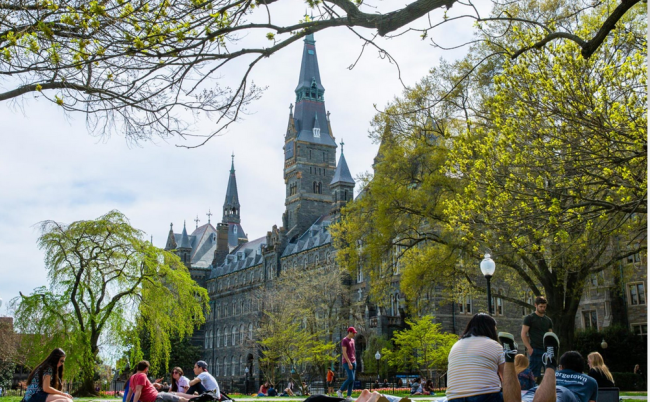You have /5 articles left.
Sign up for a free account or log in.

Georgetown University
Amin Khoury, the father of a Georgetown University student, was acquitted Thursday on charges that he paid $180,000 in cash to Gordon Ernst, Georgetown’s tennis coach, to have his daughter admitted, The New York Times reported.
The case was similar to the Varsity Blues cases, but it was not one of them. In this case, a different middleman was involved. Khoury’s defense was that such payments are sought by many universities. In Khoury’s case, the middleman was a friend of his from Brown University. When Khoury was a student at Brown, he played on the tennis team with the middleman and Ernst.
Khoury’s lawyer, Roy Black, said, “Georgetown had a team of people that researched what the father did, what his income was, how much their homes cost. They figured they could get somewhere between one and five million from him, that’s how cynical this is.”
Black also said, “We proved beyond any doubt that wealth is a huge factor in getting admitted into these elite universities—I’m not talking about the government-funded universities, I’m talking about the Ivy Leagues and Georgetowns.”
He added, “I tried to emphasize to the jury that the federal government had no part in getting into these private businesses. These schools are private businesses that spend 24 hours a day fund-raising, and there’s no tax dollars involved, no government officials involved, no government policies. So No. 1, the federal government should not be involved in it.”
Georgetown officials did not respond to a request for comment.
Rachael S. Rollins, a U.S. attorney from Massachusetts, where the case was prosecuted, issued a statement on the acquittal.
“Although we respect the jury’s verdict, we are disappointed,” Rollins said. “The government believes that the conduct and facts in this case warranted Mr. Khoury’s prosecution. Despite today’s verdict, this investigation, as well as the dozens of successful ‘Varsity Blues’ prosecutions, have resulted in enormous and systemic changes in the college admissions process. These cases writ large have exposed the disturbing, improper and inequitable role that wealth and privilege can play in distorting a system that is supposed to be merit based.”
The Varsity Blues Scandal
While the case was not among the Varsity Blues cases, its allegations were quite similar.
Varsity Blues started in March of 2019, with 50 indictments in a scheme that allegedly involved faux athletes, coaches who could be bribed, cheating on the SAT and ACT, million-dollar bribes, and “guarantees” that certain applicants would be admitted to highly competitive colleges. Every case that has gone to trial has ended in a conviction, but most of those indicted admitted their guilt. (One of those indicted, Robert Zangrillo, was pardoned by former president Trump.)
The case was embarrassing to higher education for its focus on wealthy parents working so hard (and, except for the Khoury case) and so illegally to get their children into college. But the case didn’t address the many ways, from private counselors to admissions preferences for legacy children, that wealthy parents legally help their children get into college.




